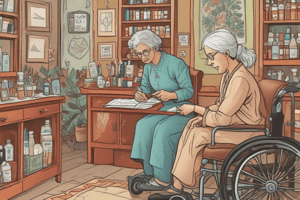Podcast
Questions and Answers
What is chronological age?
What is chronological age?
Refers to the number of years a person has lived.
What age range is categorized as 'young-old'?
What age range is categorized as 'young-old'?
What is geriatric nursing?
What is geriatric nursing?
Gerontophobia is the fear of getting old.
Gerontophobia is the fear of getting old.
Signup and view all the answers
What does financial gerontology involve?
What does financial gerontology involve?
Signup and view all the answers
What are the implications of an increasing older population?
What are the implications of an increasing older population?
Signup and view all the answers
What is one reason for living longer?
What is one reason for living longer?
Signup and view all the answers
When was the first article on the nursing of the aged published?
When was the first article on the nursing of the aged published?
Signup and view all the answers
What was established in 1966 that gave nursing of the aged specialty status?
What was established in 1966 that gave nursing of the aged specialty status?
Signup and view all the answers
Study Notes
Chronological Age
- Refers to the actual number of years a person has lived.
- Categories include:
- Young-old: 65-74 years
- Middle-old: 75-84 years
- Old-old: 85 years and above
Geriatrics and Gerontology
- Geriatrics: Branch of medicine focused on diseases and issues in old age (derived from Greek words meaning old age and medical treatment).
- Gerontology: Scientific study of aging processes and challenges faced by the elderly (from Greek for old man).
Aging Concepts
- Physiologic Age (or Biological Age): Reflects how well the body functions in comparison to chronological age.
- Functional Age: Represents an individual's ability to contribute to society and their functional status in daily life.
Nursing Specialties
- Geriatric Nursing: Focuses on nursing care for older individuals with health issues, emphasizing tertiary care.
- Gerontological Nursing: Deals with health assessments and care of older adults, considering their totality.
- Gerontological Rehabilitation Nursing: Merges gerontological nursing with rehabilitation concepts.
Financial and Social Gerontology
- Financial Gerontology: Integrates financial planning with knowledge of older adults' specific needs.
- Social Gerontology: Examines the social influences of aging and societal roles of the elderly.
Phobias and Stereotypes
- Gerontophobia: Fear and resistance towards older individuals in society.
- Gerascophobia: Fear of aging itself.
- Ageism: Negative stereotypes associated with aging and older people.
- Age Discrimination: Differentiating treatment based on an individual's age.
Implications of an Aging Population
- Highlights the necessity for resources to support older adults in leading fulfilling lives.
- Increased demand for specialized facilities and competent geriatric nursing.
- Rising life expectancy combined with decreasing mortality rates.
Reasons for Longer Life Expectancy
- Advances in medical treatments and vaccines have contributed to improved health outcomes.
- Enhanced nutritional standards and accessibility.
- Development of new diagnostic techniques for early disease detection and management.
History of Gerontological Nursing
- Early 1900s: Recognition of the need for specialized gerontological nursing.
- 1904: Publication of the first article on nursing for older adults.
- 1966: Establishment of the Division of Geriatric Nursing Practice, providing specialty status to geriatric nursing.
- Progress throughout the decades includes the formation of board and care homes in the 1930s, publication of key texts in the 1950s, and landmark studies in the 1960s highlighting common issues faced by hospitalized older adults.
Studying That Suits You
Use AI to generate personalized quizzes and flashcards to suit your learning preferences.
Description
This quiz covers essential concepts in geriatrics, focusing on the care of older adults. It includes definitions, age categories, and important terminologies. Ideal for nursing students enrolled in the BSN program.




